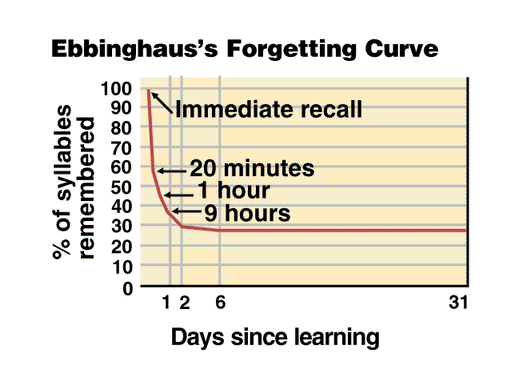Forgetting
Forgetting:
3 main reasons for forgetting:
1. Diverted Attention:
e.g. not remembering where you put your car keys because you were thinking of something else at the time.
e.g. being distracted while trying to read a book. Don't remember what you've read.
e.g. Which image is actually a penny?
2. Decay:
Ebbinghaus (1885) studies on forgetting:
Method: he learned lists of nonsense syllables (TPQ, VEH) until he could recall them perfectly. Then he tested how much of the list he forgot over time.
Results:

3. Interference:
Proactive Interference:
e.g. if you buy a new padlock with a combination, the old combination may interfere with your memory
e.g. if you move, your old phone number may interfere with remembering your new phone number.
Retroactive Interference:
e.g. learning Spanish now makes it more difficult to remember the French you learned earlier.
Jenkins & Dallenbach (1924)Method: students learn a list of nonsense syllables, which they had to recall 8 hours later.
1st group was awake doing other things for the 8 hours
2nd group was asleep for the 8 hours.
Results:
Memory Distortions:
Elizabeth Loftus: done more than 200 experiments on memory distortions
misinformation effect:
Loftus' classic experiment:
Method: showed students a video of a car accident
Group 1 was asked "How fast was the car going when it smashed into the other car?"
Group 2 was asked "How fast was the car going when it bumped into the other car?"
One week later they asked subjects whether there was any broken glass (correct answer=no)
Results:
Conclusion:
False memories:
Goff & Roediger (1998) -- showed that imagining nonexistent actions and events can create false memories.
Method: Students had to imagine doing simple acts during the experiment such as breaking a toothpick or picking up a stapler.
Results:
Garry (1996)
Method: students had to imagine themselves doing some activity as a child that they had never done before (e.g. running, then tripping & falling, and cutting their hand as it went throught a window).
Results: